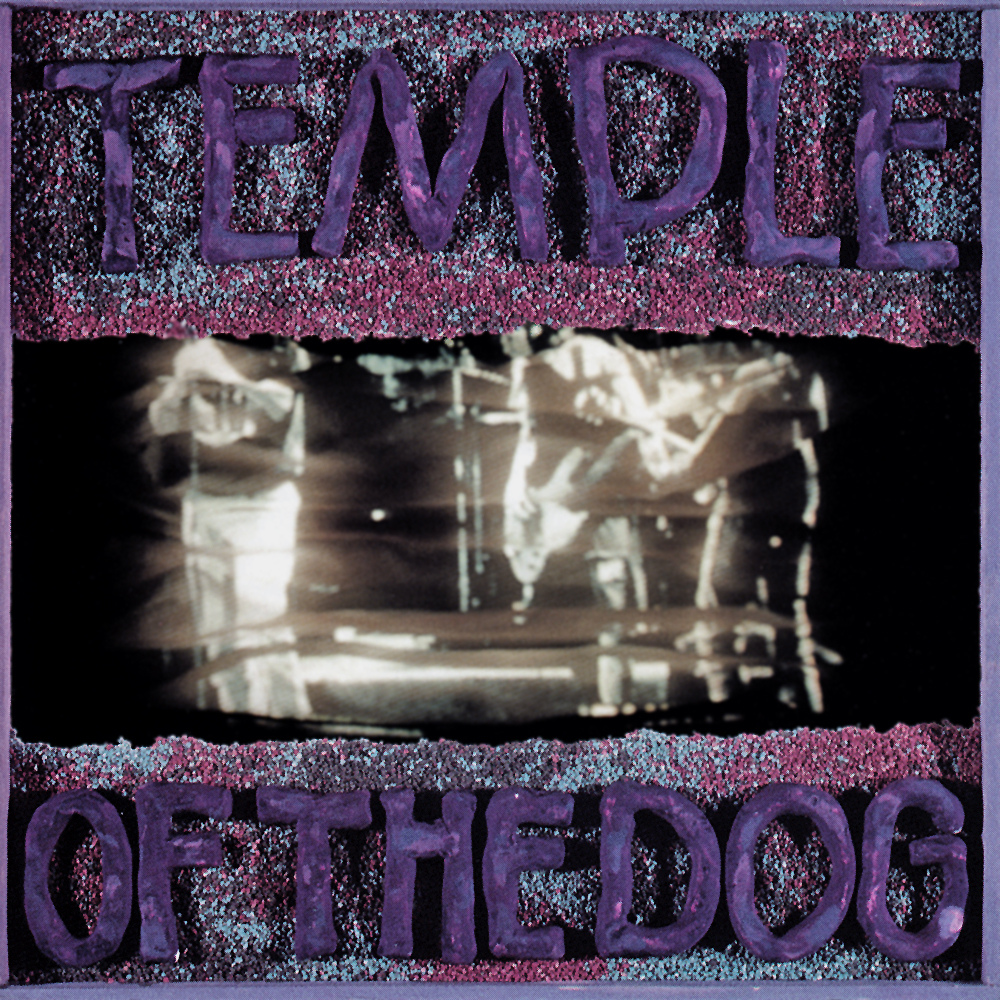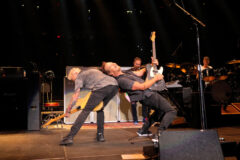For a brief spell yesterday morning, social media was in a state of excitement over a band we hadn’t really heard from in a quarter-century: Temple of the Dog. A one-off project formed in 1990 featuring members of Soundgarden and Pearl Jam, the band’s sole album was released in 1991 and became a big hit the following year, but aside from a few casual reunions between the longtime friends over the years, the band never actually toured before. That will change in November, as Temple of the Dog will reunite to play headlining shows in Philadelphia, New York, San Francisco, Los Angeles, and Seattle. In addition, to commemorate its upcoming 25th anniversary, the band’s sole album will be re-released in expanded editions on September 30.
By the end of 1990, anyone who followed rock music was well aware that the Seattle scene was set to explode. Soundgarden was leading the charge with their boisterous Zeppelin/Wipers hybrid sound, thanks to the exhilarating bombast of their critically acclaimed sophomore LP, 1989’s Louder Than Love. Alice in Chains’ debut album, 1990’s Facelift, attracted the metal crowd and landed the band plum slots opening on arena tours with Van Halen and Poison. Mudhoney had followed up the epochal, scene-defining “Touch Me I’m Sick” single with an ’89 self-titled debut album that made its way onto college radio stations nationwide. The Gits specialized in searing punk rock, led by the indomitable singer Mia Zapata. At the same time, an oddball outfit from nearby Aberdeen named Nirvana was blending noise-rock and pop smarts in a way that, by the end of 1991, would change rock music forever.
Mother Love Bone was another grunge act pegged for breakout success, but in March 1990 — right before their major-label debut, Apple, was to be released — singer Andrew Wood died of a heroin overdose. The rest, of course, is history. Mother Love Bone was no more; Wood’s surviving bandmates, guitarist Stone Gossard and bassist Jeff Ament, would form a new band that year, and with a deep-voiced surfer kid from California named Eddie Vedder stepping in as frontman, that group would go on to be one of the biggest American rock acts of the modern era.
Bridging the demise of Mother Love Bone and the recording of Pearl Jam’s classic debut LP, 1991’s Ten, was a special project led by Wood’s roommate, Soundgarden singer Chris Cornell. The singer-guitarist, who’d written a pair of songs in tribute to his late friend, approached Gossard and Ament to record them; soon after, Soundgarden drummer Matt Cameron and local guitarist Mike McCready rounded out the new project. Named after a Wood lyric from the MLB song “Man of Golden Words,” Temple of the Dog was born. With Vedder along for the ride contributing backing vocals (and one classic duet performance with Cornell), the band’s debut was recorded in late 1990 and eventually released on A&M Records in April 1991.
Featuring seven solo compositions by Cornell, two by Gossard, and one collaboration between Gossard and Ament, Temple of the Dog predated the release of three crucial Seattle albums: Soundgarden’s Badmotorfinger, Pearl Jam’s Ten, and Nirvana’s Nevermind. In retrospect, of course, one can envision the TOTD album as a precursor to the grunge explosion that was about to happen, and it’s beloved by many Gen-Xers to this day, but in 1991 it was viewed more simply. In essence it is a surprisingly subdued, sweet, nuanced little record that owes a lot more to mainstream rock than the trendier sounds that were coming out of Seattle at the time. In that modesty and adherence to formula lies its charm — 25 years later, Temple of the Dog has aged rather gracefully.
As great as Cornell already was at writing scorching, metal- and hardcore-derived tracks like “Gun,” “Louder Than Love,” and “Full on Kevin’s Mom” for Soundgarden, Temple of the Dog showcases his more sensitive side; the album’s first three tracks rank as some of the finest work of Cornell’s career. Combining the elegiac beauty of Skynyrd’s “Tuesday’s Gone” and the blue-collar appeal of pop-metal crews Tesla and Badlands, “Say Hello 2 Heaven” succeeds mightily because of Cornell’s mastery of dynamics. At nearly six and a half minutes, the song takes its sweet time, building to a gorgeous southern-rock solo by McCready. Also in tribute to Wood, whose persona was closer to Steven Tyler than Iggy Pop, Cornell embraces flamboyance, turning in a powerful, colorful performance that showed more musical and emotional depth than Soundgarden’s work up to that point.
https://youtube.com/watch?v=5qi8hhiYEQA
The set’s second track, “Reach Down,” hints at future Soundgarden arena ballads like “Black Hole Sun” and “Fell on Black Days,” but slowly morphs into a mix of soul and jam-band texture, capped off by an extended instrumental section that foreshadows the chemistry between Gossard, McCready, and Ament that would make for one of Pearl Jam’s most enduring strengths. Most striking of all, though, is Cornell’s lyrical tribute, which paints a vivid picture of the late Wood: “I had a dream the other night / You were in a bar in the corner on a chair / Wearing a long white leather coat / Purple glasses and glitter in your hair.”
“Hunger Strike,” the band’s signature song, is to grunge as “Every Rose Has Its Thorn” is to pop metal: the defining power ballad of the genre’s heyday. While metal bands sang bluntly about sex, grunge bands proudly claimed to above all that, and the pretentiousness of claiming to feel guilt over success in comes off as insufferable today. Take this bit of “Hunger Strike”: “I don’t mind stealing bread from the mouths of decadence / But I can’t feed on the powerless when my cup’s already overfilled.” Still, Cornell and Vedder turn a half-baked lyric into a glorious piece of melodrama that plays up the “dignity” and faux-“integrity” of post-hairspray rock to the hilt. They sell it brilliantly, the high-pitched Cornell and the lower-register Vedder complementing each other impeccably. Bolstered by a gorgeous guitar intro and a monstrous riff slicing through the track’s bridge, it’s no wonder the song became a minor hit in 1991, and a major hit a year later. Its timing and execution were perfect, and remain so today.
At 55 minutes, the album risks stretching out a little too far: “Wooden Jesus” and the flaccid “Four Walled World” make the whole experience 11 minutes longer than it ought to be. Thankfully, the easygoing nature of the performances help make the deeper cuts appealing. “Pushin’ Forward Back” is a heavy jam straight out of Rocks-era Aerosmith, while Cornell’s “Call Me a Dog” and Gossard’s “Times of Trouble” tread the same musical path as “Say Hello 2 Heaven,” both strengthened by their stripped-down, piano-accentuated arrangements. “Your Savior” is an underrated slice of blues-rock, and shuffling closer “All Night Thing” is a beautiful, suitably understated way to cap off the record.
Compared to Badmotorfinger, Ten, and Nevermind, Temple of the Dog felt like an anomaly during that pivotal year: It was quieter, more tender, and much more traditional than those three landmark records. The album’s imperfect, but its scruffy appeal was enough to help it soar up the charts a year after its release, cashing in on grunge’s oversaturation. And that unassuming quality has made TOTD a second-tier classic to so many people who were in their teens and 20s in 1991. Now, as those same fans are settling into middle age, they’ll welcome the chance to say hello to this band and their underrated debut LP once again.
Correction: A previous version of this article referred to “Reach Down” as “Reach Out.”





